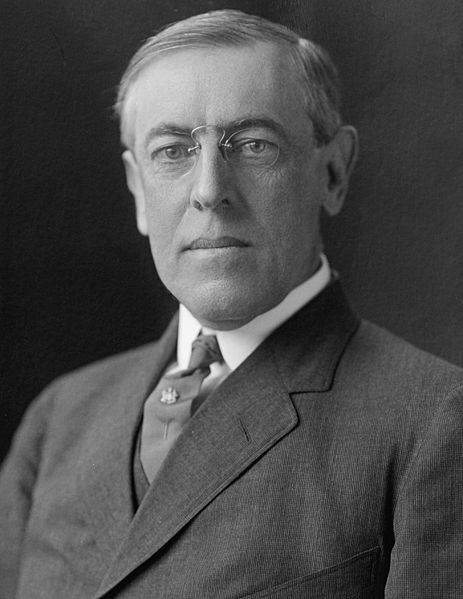
28th President of the United States
美国第28任总统渥道尓威尓逊(Woodrow Wilson)
In office
March 4, 1913 – March 4, 1921
Vice President Thomas R. Marshall
Preceded by William Howard Taft
Succeeded by Warren G. Harding
朗读 Woodraw Wilson
来源: selfselfself 于 10-03-19 20:32:20
http://web.wenxuecity.com/BBSView.php?SubID=mysj&MsgID=72918
Woodrow Wilson
From Wikipedia, the free encyclopedia
Thomas Woodrow Wilson (December 28, 1856 – February 3, 1924) was the 28th President of the United States. A leading intellectual of the Progressive Era, he served as President of Princeton University from 1902 to 1910, and then as the Governor of New Jersey from 1911 to 1913. With Theodore Roosevelt and William Howard Taft dividing the Republican Party vote, Wilson was elected President as a Democrat in 1912.
In his first term, Wilson persuaded a Democratic Congress to pass the Federal Reserve Act, Federal Trade Commission, the Clayton Antitrust Act, the Federal Farm Loan Act and America's first-ever federal progressive income tax in the Revenue Act of 1913. Wilson brought many white Southerners into his administration, and tolerated their expansion of segregation in many federal agencies.
Narrowly re-elected in 1916, Wilson's second term centered on World War I. He based his re-election campaign around the slogan "he kept us out of the war", but U.S. neutrality was challenged in early 1917 when the German government proposed to Mexico a military alliance in a war against the U.S., and began unrestricted submarine warfare, sinking without warning every American merchant ship its submarines could find. Wilson in April 1917 asked Congress to declare war.
He focused on diplomacy and financial considerations, leaving the waging of the war primarily in the hands of the Army. On the home front in 1917, he began the United States' first draft since the US civil war, raised billions in war funding through Liberty Bonds, set up the War Industries Board, promoted labor union growth, supervised agriculture and food production through the Lever Act, took over control of the railroads, enacted the first federal drug prohibition, and suppressed anti-war movements. National women's suffrage was also achieved under Wilson's presidency.
In the late stages of the war, Wilson took personal control of negotiations with Germany, including the armistice. He issued his Fourteen Points, his view of a post-war world that could avoid another terrible conflict. He went to Paris in 1919 to create the League of Nations and shape the Treaty of Versailles, with special attention on creating new nations out of defunct empires. Largely for his efforts to form the League, he was awarded the Nobel Peace Prize. In 1919, during the bitter fight with the Republican-controlled Senate over the U.S. joining the League of Nations, Wilson collapsed with a debilitating stroke. He refused to compromise, effectively destroying any chance for ratification. The League of Nations was established anyway, but the United States never joined. A Pre*****yterian of deep religious faith, he appealed to a gospel of service and infused a profound sense of moralism into Wilsonianism. Wilson's idealistic internationalism, now referred to as "Wilsonianism", which calls for the United States to enter the world arena to fight for democracy, has been a contentious position in American foreign policy, serving as a model for "idealists" to emulate and "realists" to reject ever since.
******************
美国第28任总统渥道尓威尓逊1913年就职演说辞(音频/原文)
来源: 野鹤闲云 于 10-03-17 23:32:16
http://web.wenxuecity.com/BBSView.php?SubID=mysj&MsgID=72860